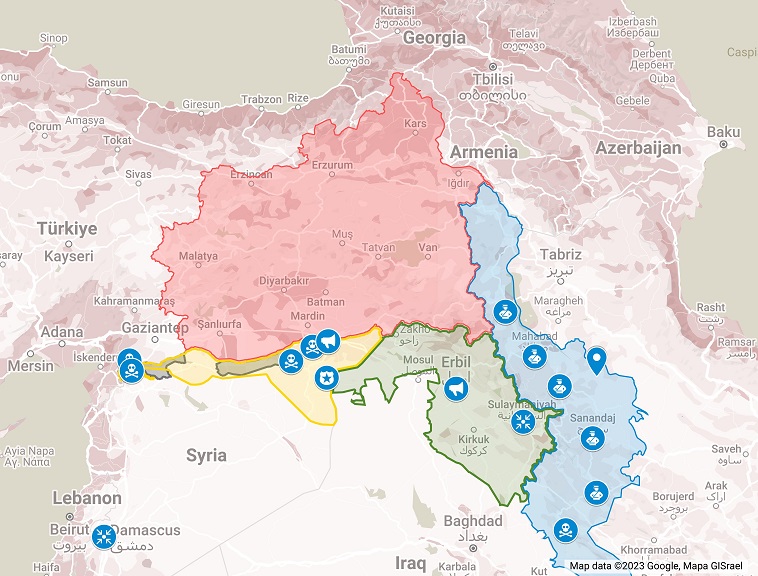2K
A weekly brief of events occurred in the Kurdistan regions of Iran, Iraq, Syria, and Turkey.
Iran
- Iranian regime forces arrested dozens of protestors in West Azerbaijan Province’s Aqdara village and severely wounded three. The raid on Aqdara began when several Kurdish men gathered in front of a gold mine and demanded employment. Iranian security forces and municipal officials in Ilam destroyed a Kurdish home, broke up a small demonstration, wounded three Kurds, and arrested six more. The regime also arrested a number of activists across Iranian Kurdistan, including Mohammed Haseli in Sarabbagh, Assad Mohammdi, Massoud and Ibrahim Mirzaie, and Hozan Baba Karimi in Senna, Omed Mazloum in Mehabad, Murad Tajgarodun in Naghadeh, Yassir Noori in Jwanru, Hussein Chokali in Urmia, and Haider Qubati in Kermanshah. Lastly, Islamic Revolutionary Courts sentenced Burhan Saedi to two years in prison for “forming groups against the national security” in Senna, Bayan Salehian to eight months in prison in Saqqez, and Waran Mohammadnejad to one year in prison.
Iraq
- The Kurdistan Democratic Party (KDP) and Patriotic Union of Kurdistan (PUK) responded to U.S. threats to stop supporting the Peshmerga because of internal divisions by reaching a five-point agreement on July 30. Both parties agreed internal divisions should not impede the delivery of essential services in Iraqi Kurdistan and expressed a desire to support the Kurdistan Regional Government’s (KRG) Ninth Cabinet. Representatives from the U.S.-led Coalition met with the Ministry of Peshmerga to discuss implementing the reforms agreed upon last September. The U.S. desires quicker change, however, and asked Minister of Peshmerga Shosh Ismail to cease his boycott protesting the PUK’s influence on Peshmerga affairs and return to work.
- Disputes continued regarding the salaries of KRG employees last week. A source told Kurdistan 24 that Baghdad will send some money to pay KRG employee salaries this week. Similarly, Omid Sabah from the KRG Ministry of Finance said that Baghdad and Erbil have come to a written agreement on the implementation of the budget law and plan to “fund the KRG immediately.” That said, unresolved questions remain, and a delegation from the KRG Ministry of Finance is set to visit Baghdad to discuss the salary issue on July 31. KRG spokesperson Peshawa Hawramany said the Iraqi government should send the budget if it believes the KRG is part of Iraq.
Syria
- On July 28, special security units affiliated with the Syrian Democratic Forces (SDF) arrested five Da’esh terrorists in the al Hol camp. A joint SDF-U.S-led Coalition operation captured another Da’esh operative outside of Deir Ez Zor on July 30. Despite the SDF and Coalition’s successes, Da’esh remains a persistent threat in Syria and launched two attacks in SDF and Assad regime-controlled territories that caused 11 casualties. Meanwhile, on July 27, an abandoned landmine injured four children who were collecting scrap metal near Deir Ez Zor.
- On July 27, the Russian Foreign Ministry announced that normalization between Damascus and Ankara would continue via the Astana process, though it is unknown where future meetings will be held. In June, Kazakhstan announced it would no longer host such talks. Nonetheless, Syrian Foreign Minister Faisal Miqdad met with Iranian officials in Tehran on July 30 to discuss strengthening ties between the two nations and furthering the Assad regime’s normalization. Concurrently, on July 29, Lebanese Minister of the Displaced Isam Charafeddine announced he is ready to discuss the issue of Syrian refugees in Lebanon with the Assad regime in Damascus. On July 27, Turkey declared its intent to move more than one million displaced Syrians back to Syria. Turkey has already deported 950 refugees to northwestern Syria during the past week and intends to settle large numbers of Syrians in formerly Kurdish areas to alter their demographics. On July 31, Turkey completed the construction of 50 new apartments in Afrin’s Shahran District, which was once majority Kurdish.
- Turkey escalated its bombardment of several areas in northern Syria. On July 25, Turkish forces bombed the SDF-controlled Qabur Qaranja village near Tel Tamer. The next day, Turkey shelled the villages of al Darara and Tal Qara, and Turkish proxies raided nine civilian homes in Tal Abyad, destroying property and stealing personal belongings. On July 27, Turkish proxies arrested four Kurdish people in Afrin for serving the Autonomous Administration of North and East Syria (AANES) before Turkey occupied the city. On July 28, a Turkish drone strike on an SDF training camp near Khirbet Khoy killed four and wounded eight. On July 30, Turkey and its proxies wounded three civilians when they shelled Tal Laban and Tal Tamer. On Monday, July 31, a Turkish bombing injured a woman and her child in Afrin, and Turkish artillery killed two SDF personnel east of Ain Issa. The AANES condemned the silence of the U.S.-led Coalition on Turkey’s ongoing aggression and warned it could weaken the SDF and other allies’ willingness to partake in future joint operations.
Turkey
- The pro-Kurdish Peoples’ Democratic Party (HDP) and its offshoot the Green Left Party (YSP) continued holding public meetings across Turkey to discuss new ideas and improving political performance after May’s elections. The HDP announced 400,000 people and hundreds of its leaders participated in the meetings. Turkey’s Kurdish parties faced criticism after they lost several seats in Turkey’s Grand National Assembly and Turkish President Recep Tayyip Erdogan was reelected. The HDP and its allies are now preparing for provincial elections in March 2024.
- President Erdogan raised Turkey’s interest rate for a second consecutive month in an attempt to revitalize the nation’s sluggish economy. At the same time, Erdogan replaced three deputy Central Bank governors in an effort to attract Western investors. Separately, a new scandal has arisen regarding Erdogan’s son-in-law’s alleged renting of drones to the Turkish government for millions of dollars. Though Erdogan has denied involvement, contracts between the Turkish Defense Ministry and his son-in-law’s Baykar company have totaled $10.7 million so far.

